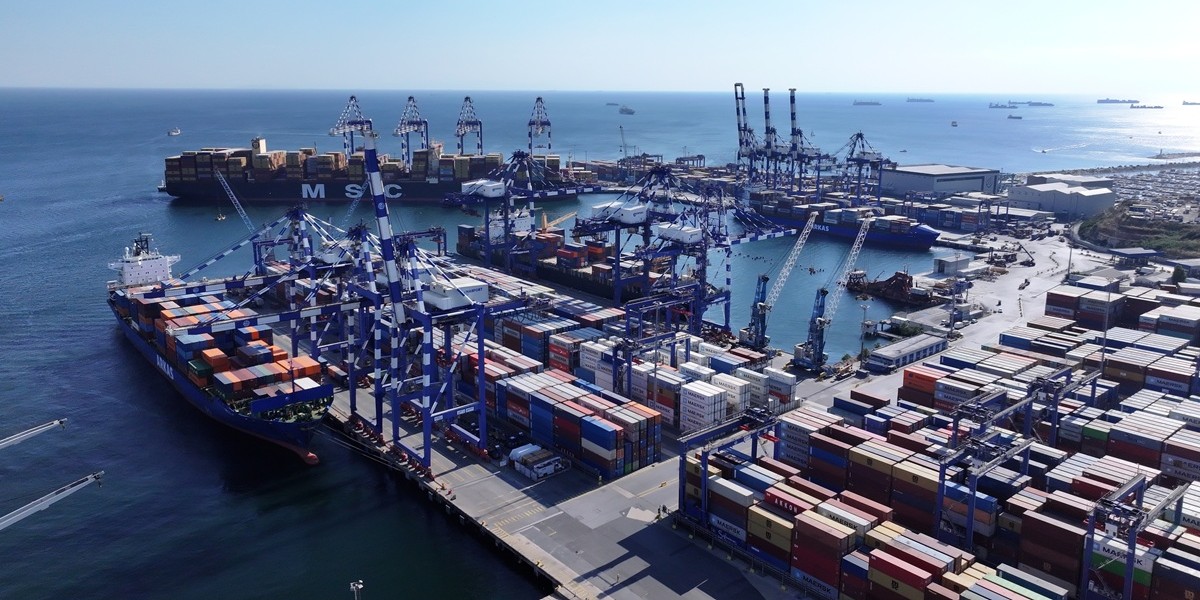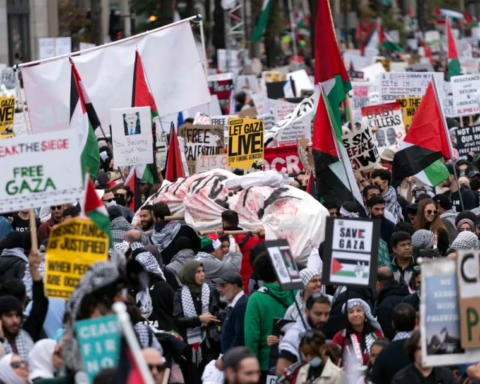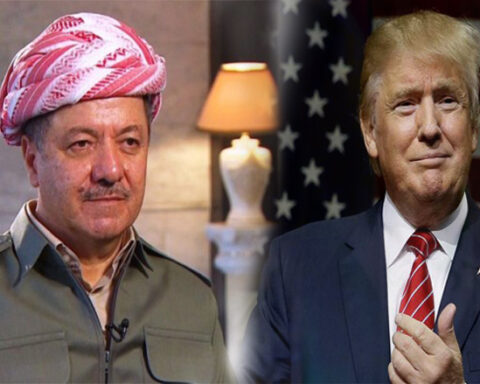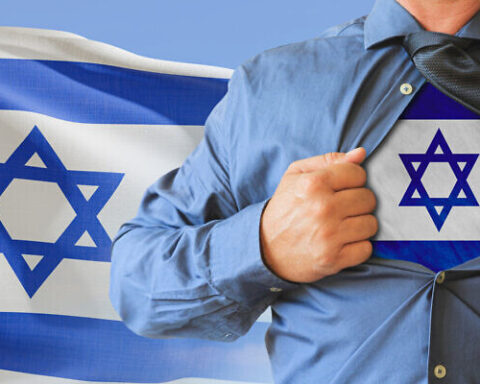The acquisition of rights to develop and operate a logistics zone near the Suez Canal by Abu Dhabi Ports Group has raised deep concerns among Egyptians. Many fear that this growing control over Egypt’s ports could undermine the future of the vital international waterway.
The controversial project centres on managing the KIZAD Port Said zone, covering 20 square kilometres of the total area of East Port Said, located at the northern entrance of the Suez Canal in northeastern Egypt.
The project, implemented in three phases, is governed by a usufruct agreement for 50 years, and is renewable. In return, Egypt receives only 15 per cent of the project’s revenues — a rate that is fixed and non-negotiable.
Emirati Expansion
The common English phrase “the devil is in the details” reflects Egyptians’ concerns about the UAE’s expanding influence in the Egyptian economy and the unease surrounding the specific terms of the agreements signed between Abu Dhabi and Cairo.
The UAE holds partial or full control over the operation and development of nearly half of Egypt’s 16 commercial ports. Among the most significant are Safaga Port on the Red Sea—granted under a 30-year agreement—and two terminals at Sokhna Port, also operated for 30 years by Abu Dhabi Ports Group.
At the beginning of last year, a new agreement was signed granting the Emirati group the right to manage three vessel terminals at the ports of Safaga, Hurghada, and Sharm El-Sheikh, all located on the Red Sea, for a period of 15 years, renewable.
This expansion continued with two additional agreements between Abu Dhabi Ports and the General Authority for the Suez Canal Economic Zone (a government body) to build cement-handling terminals in Arish and West Port Said, each under 15-year agreements.
During the current year, the Emirati group signed a Memorandum of Understanding with Egypt’s Ministry of Transport to manage and operate an integrated logistics zone at Port of Alexandria on the Mediterranean Sea, bringing the UAE’s presence to seven Egyptian ports on both the Red Sea and the Mediterranean.
If a new port is established under the Ras El-Hekma development project, which was acquired last year by Abu Dhabi’s sovereign wealth fund, and given the UAE’s existing logistics role at Adabiya Port, south of the Suez Canal, as well as operations at an inland river port in Minya and a dry port in 10th of Ramadan City, its influence would extend to over ten Egyptian ports, including maritime, river, and dry ports.
Beyond port operations, Abu Dhabi Ports owns 70 per cent of International Associated Cargo Carrier, which in turn owns Transmar (a maritime transport firm) and Trans cargo International (TCI), the exclusive container operator at Adabiya Port in Suez.
The Emirati group also holds a majority stake in Safina Shipping Services, a maritime and freight service provider operating in Egypt and the broader Middle East. Additionally, ADQ, Abu Dhabi’s holding company, acquired a 32 per cent stake previously owned by the Alexandria Port Authority in Alexandria Container and Cargo Handling Company. It is now seeking to acquire significant shares in Port Said and Damietta container terminals, which are vital to Egypt’s port operations.
Strategic Tactics
The UAE’s broad economic footprint in Egypt reflects a dual military-commercial strategy, blending elements of both the Venice and Sparta models, thus preparing the Gulf state for a post-oil future.
The KIZAD Port Said agreement is part of this strategy to dominate Red Sea, Bab El-Mandeb Strait, and East African ports, secure access to the Mediterranean, and control key global supply chains, according to maritime transport expert Mahmoud Khalil.
Speaking to Middle East Monitor, Khalil noted that the UAE now owns or manages between six to eight of Egypt’s 16 ports. He also pointed out that the UAE deliberately delayed developing Ain Sokhna Port, despite contractual obligations, likely because it is in its interest to avoid developing ports that could compete with its own. At the very least, it seeks to limit their activity in order to keep Dubai and Abu Dhabi from facing regional competition as global hubs for trade, travel, and cargo transport.
According to maritime expert Mohamed Hammadi, a 2008 agreement granted Dubai Ports World rights to develop Sokhna Port for $670 million, with plans to increase its capacity to 2 million containers per year. As of 2021, however, the port’s capacity had reached only 511 containers, falling far short of the target.
Dubai Ports World claimed in a 2024 statement that it had completed 65 per cent of the first phase of its logistics project in Sokhna, more than 16 years after the original agreement was signed.
Economists have described these tactics as part of a competition-killing strategy that effectively hands the UAE control of maritime transport in the region, while simultaneously safeguarding the influence of Jebel Ali Port, which ranked among the world’s top ten ports in 2024.
Israeli Infiltration
A more troubling aspect is the possibility that UAE investments in Egypt are linked to Israeli and American interests. These investments may serve as fronts for multinational corporations with ties to Western or Israeli stakeholders, raising concerns over Egypt’s national security, according to political analyst Hamdi El-Masri.
El-Masri’s warning is echoed by an October 2022 report from the French intelligence platform Africa Intelligence, which noted that Abu Dhabi Ports had emerged as the most aggressive competitor for Egyptian ports on both sides of the Suez Canal and the Red Sea.
Dr Alia El-Mahdi, a professor of economics at Cairo University, voiced her opposition to the KIZAD Port Said deal on Facebook. “I simply cannot accept the idea of the UAE being involved in such a massive project in the Suez Canal Economic Zone,” she wrote, citing two reasons:
First, because it would ultimately destroy Jebel Ali Port, which makes no sense. And second, because the UAE supports the proposed trade corridor from Mumbai to the UAE, Saudi Arabia, Jordan, Israel, and finally Europe, a project that directly undermines the Suez Canal.
Secretive Contracts
The Egyptian government frequently withholds the terms and details of its agreements, many of which are awarded through direct contracting and assigned to a single party, often the UAE, without public tenders or parliamentary oversight. These deals typically span long periods and are renewable, with disproportionately low financial returns considering the length of control, which can extend up to 50 years. This was the case with the agreement signed in May this year, mirroring a 2008 contract that granted DP World the right to develop, manage, and operate Ain Sokhna Port until 2049.
The reality is that Emirati companies have consistently failed to meet their development obligations in Egypt, causing repeated delays and raising serious questions about the future of Egypt’s port sector.
These long-term agreements, shrouded in secrecy, legally protected from challenge under Egyptian law, and offering low returns, have raised widespread suspicions, especially as Emirati acquisitions increasingly target ports near the Suez Canal.
The UAE is a key ally of Egyptian President Abdel Fattah El-Sisi’s regime and has provided generous grants, loans, and aid since the ouster of the late President Mohamed Morsi in the July 2013 coup.
Source: https://www.middleeastmonitor.com/20250520-how-the-uae-took-control-of-egypts-ports/






